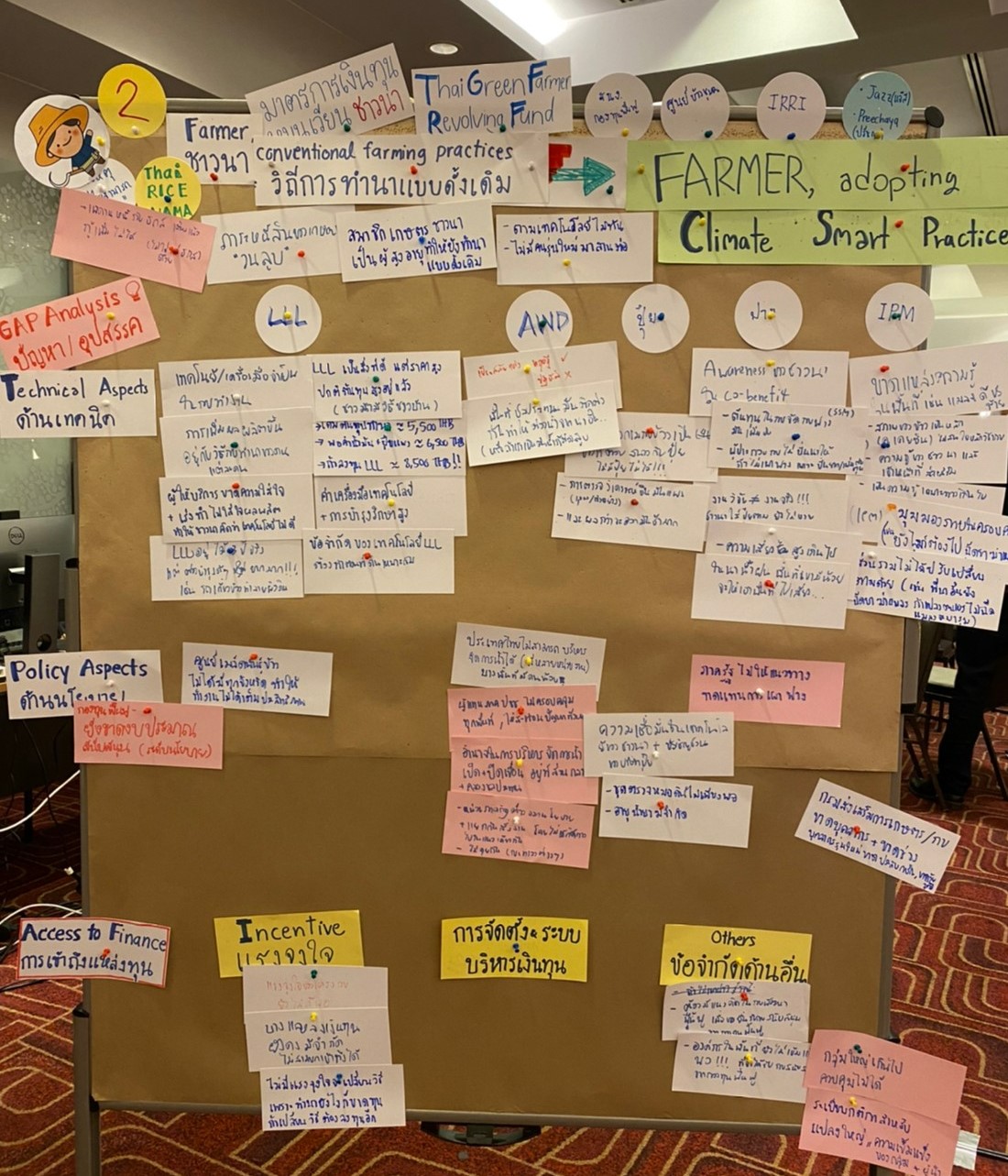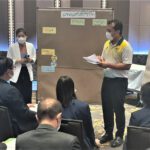More than 30 agricultural and financial experts from government and private sectors and universities participated during a recent consultation workshop on the topic “Feasible and Sustainable Financial Mechanism and Instruments: Proposed Options and Recommendations” to discuss ways to shift Thai rice sector towards low-emission rice farming practice and sustainable rice production.
Organised by GIZ together with Kasetsart University’s Faculty of Economics and a climate consultancy firm The Creagy, the workshop aimed at discussing and exchanging ideas, options and recommendations on the related financial mechanism and instruments to support Thai farmers, regarded as a crucial step for supporting the currently-developed funding proposal “Thai Rice: Strengthening Climate-smart Rice Farming” (Thai Rice GCF) project.

Following the proposed project concept, 250,000 smallholder rice farmers in 15 provinces in the North, Northeast, and central plains will be equipped with climate-resilient skills which enable them to effectively put in practice low-emission rice farming and sustainable rice production, leading to a collective mitigation of a minimum 4 million tonnes of CO2 equivalent greenhouse gas (GHG) emissions over a five-year period (Year 2023 – 2028).
During the session, the financial mechanism concept “Thai Green Farmer Facility (TGFF)”, and other possible schemes such as subsidy promotion, carbon credit for service providers, credit guarantee mechanism, rice insurance and other possible financial assistance mechanisms were presented in a bid to collect inputs and recommendations which can better utilize and amplify the existing revolving mechanism under the currently-implemented Thai Rice NAMA to effectively benefit all players in the Thai rice sector, particularly farmer smallholders.

“The intention of Thai Rice GCF development is to directly support Thai rice policies and thereby support Thai public sector through a combination of capacity building and financial support. This is an opportunity to contribute towards the national policy on Bio-Circular and Green Economy (BCG), the national plan on agricultural adaptation and water management, the national strategic plan on climate change and promotion of the sustainable and growth in the rice sector”, said Ole Henriksen, Thai Rice NAMA Project Director.
Carried out during 2018-2023 in six provinces in the Central Plains of Thailand, the Thai Rice NAMA project is aimed at transforming the rice sector into low-emission production with 100,000 farmer households expected to adopt farming techniques and innovation in a bid to increase rice yields, rice quality and revenue while decreasing production costs, water consumption and ultimately greenhouse gas emissions. Sustainable rice improves quality of life and livelihoods while preserving the environment vulnerable to global warming.
Mr. Henriksen emphasised that GHG emissions from rice cultivation practice is significant.

According to the International Rice Research Institute, rice is responsible for 10% of global methane emissions, and in Southeast Asia, one the world’s major rice bowls, rice cultivation accounts for as much as 25-33% of the region’s methane emissions.
Amid rising temperatures, more frequent droughts, floods, and intense typhoons, Thai rice farming and farmer livelihoods are at the frontline of risk and vulnerability. Therefore, it is necessary to continue supporting the Thai rice sector while creating climate resilience for smallholder farmers by introducing the proposed Thai Rice GCF project after a completion of the Thai Rice NAMA project next year, he said.

Nareerat Panmane, Director of Climate Change Management and Coordination Division, Office of Natural Resources and Environmental Policy and Planning (ONEP), Ministry of Natural Resources and Environment, highlighted that the Thai Rice GCF proposal could enable Thailand to reach carbon neutrality by 2050 and achieve its goal toward net-zero GHG emissions even prior to 2065.
“A transition of Thai Rice NAMA, which currently addresses only climate mitigation measure, to the proposed Thai Rice GCF project prioritising both climate mitigation and adaption, will help Thailand move closer to the goal,” she said during the workshop. “By working with the Thai Rice NAMA project, ONEP is aware of a potential to reduce not only CO2, but other methane in the agricultural sector. The GCF funding proposal is a great starting point to integrate the climate adaptation into implementation in a bid to assist our agricultural sector to reduce greenhouse gas emissions and become more resilient.”
To address climate resilience in agriculture sector, engagements from all related stakeholders is essential for helping find viable options for tailoring financial assistance mechanisms as well as climate change adaptation and mitigation projects to further mobilise the GCF funding proposal.
Ms. Panmane said ONEP also planned to present the GCF proposal to the cabinet since there is a need for not only sustainable finance support but also collaboration between ministries and department to develop Thai agriculture in all aspects.
Tobias Breunig, Advisor Agricultural Finance, said inputs and suggestions on the proposed sustainable financial mechanism and instruments derived during the workshop will be consolidated into the proposed financial mechanism as GIZ is on a preparation process for a new round of the funding proposal presentation likely to be taken place by the end of year. ■












